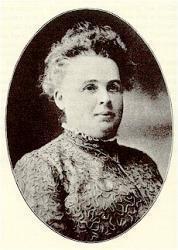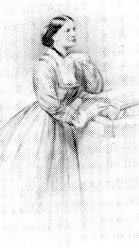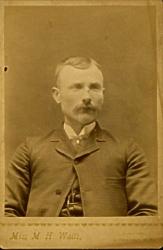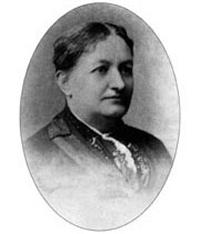Planning worship?
Check out our sister site, ZeteoSearch.org,
for 20+ additional resources related to your search.
- |
User Links
Person Results
‹ Return to hymnal







Export as CSV
Samuel W. Beazley

1873 - 1944 Hymnal Number: 84 Composer of "[Hark to the music resounding]" in The Very Best Samuel W. Beazley was born in Sparta, Virginia in 1873. He was a music scholar and taught music at Shenandoah College for five years. He composed over 4,000 gospel songs during his lifetime. Samuel W. Beazley maintained a successful publishing business in Chicago, Illinois. He died in Chicago on September 16, 1944. He was inducted into the Gospel Music Hall of Fame in 1992.
NN, Hymnary editor. Source: www.gmahalloffame.org
Samuel W. Beazley
Eben E. Rexford

1848 - 1916 Hymnal Number: 94 Author of "Little Sunbeams" in The Very Best Rexford, Eben Eugene.M (Johnsburg, New York, July 16, 1848--October 16, 1916, Shiocton, Wisconsin). Horticulturalist and editor of a Wisconsin farm journal. Many of his verses were used to fill empty corners of the journal. He also wrote many books on gardening. Lawrence University (Appleton, Wisc.), Litt.D. Twenty-five years, organist at First Congregational Church, Shiocton.
See: Smith, Mary L.P. (1930). Eben E. Rexford; a biographical sketch. Menasha, Wis., George Banta Pub. Co.
--Leonard Ellinwood, DNAH Archives and Gabriel, Charles H. (1916). Singers and Their Songs. Chicago: The Rodeheaver Company.
===============
Rexford, Eben Eugene , an American writer, born July 16, 1848, is the author of Nos. 199, 246, 263, 353, in I. D. Sankey's Sacred Songs and Solos), 1878, No. 5, and 456 in the Methodist Sunday School Hymnbook, 1879.
--John Julian, Dictionary of Hymnology, Appendix, Part II (1907)
================
Rexford, E. E. , p. 1587, ii. Additional hymns by this author in common use include:—
1. He saw the wheat fields waiting. Harvest of the World.
2. O where are the reapers. Missions.
3. Rouse up to work that waits for us. Duty.
4. We are sailing o'er an ocean. Life's Vicissitudes.
--John Julian, Dictionary of Hymnology, New Supplement (1907)
================
Eben E. Rexford
Charles Wesley

1707 - 1788 Hymnal Number: 56 Author of "To Jesus I Will Go" in The Very Best Charles Wesley, M.A. was the great hymn-writer of the Wesley family, perhaps, taking quantity and quality into consideration, the great hymn-writer of all ages. Charles Wesley was the youngest son and 18th child of Samuel and Susanna Wesley, and was born at Epworth Rectory, Dec. 18, 1707. In 1716 he went to Westminster School, being provided with a home and board by his elder brother Samuel, then usher at the school, until 1721, when he was elected King's Scholar, and as such received his board and education free. In 1726 Charles Wesley was elected to a Westminster studentship at Christ Church, Oxford, where he took his degree in 1729, and became a college tutor. In the early part of the same year his religious impressions were much deepened, and he became one of the first band of "Oxford Methodists."
In 1735 he went with his brother John to Georgia, as secretary to General Oglethorpe, having before he set out received Deacon's and Priest's Orders on two successive Sundays. His stay in Georgia was very short; he returned to England in 1736, and in 1737 came under the influence of Count Zinzendorf and the Moravians, especially of that remarkable man who had so large a share in moulding John Wesley's career, Peter Bonier, and also of a Mr. Bray, a brazier in Little Britain. On Whitsunday, 1737, [sic. 1738] he "found rest to his soul," and in 1738 he became curate to his friend, Mr. Stonehouse, Vicar of Islington, but the opposition of the churchwardens was so great that the Vicar consented that he "should preach in his church no more." Henceforth his work was identified with that of his brother John, and he became an indefatigable itinerant and field preacher. On April 8, 1749, he married Miss Sarah Gwynne. His marriage, unlike that of his brother John, was a most happy one; his wife was accustomed to accompany him on his evangelistic journeys, which were as frequent as ever until the year 1756," when he ceased to itinerate, and mainly devoted himself to the care of the Societies in London and Bristol. Bristol was his headquarters until 1771, when he removed with his family to London, and, besides attending to the Societies, devoted himself much, as he had done in his youth, to the spiritual care of prisoners in Newgate. He had long been troubled about the relations of Methodism to the Church of England, and strongly disapproved of his brother John's "ordinations." Wesley-like, he expressed his disapproval in the most outspoken fashion, but, as in the case of Samuel at an earlier period, the differences between the brothers never led to a breach of friendship. He died in London, March 29, 1788, and was buried in Marylebone churchyard. His brother John was deeply grieved because he would not consent to be interred in the burial-ground of the City Road Chapel, where he had prepared a grave for himself, but Charles said, "I have lived, and I die, in the Communion of the Church of England, and I will be buried in the yard of my parish church." Eight clergymen of the Church of England bore his pall. He had a large family, four of whom survived him; three sons, who all became distinguished in the musical world, and one daughter, who inherited some of her father's poetical genius. The widow and orphans were treated with the greatest kindness and generosity by John Wesley.
As a hymn-writer Charles Wesley was unique. He is said to have written no less than 6500 hymns, and though, of course, in so vast a number some are of unequal merit, it is perfectly marvellous how many there are which rise to the highest degree of excellence. His feelings on every occasion of importance, whether private or public, found their best expression in a hymn. His own conversion, his own marriage, the earthquake panic, the rumours of an invasion from France, the defeat of Prince Charles Edward at Culloden, the Gordon riots, every Festival of the Christian Church, every doctrine of the Christian Faith, striking scenes in Scripture history, striking scenes which came within his own view, the deaths of friends as they passed away, one by one, before him, all furnished occasions for the exercise of his divine gift. Nor must we forget his hymns for little children, a branch of sacred poetry in which the mantle of Dr. Watts seems to have fallen upon him. It would be simply impossible within our space to enumerate even those of the hymns which have become really classical. The saying that a really good hymn is as rare an appearance as that of a comet is falsified by the work of Charles Wesley; for hymns, which are really good in every respect, flowed from his pen in quick succession, and death alone stopped the course of the perennial stream.
It has been the common practice, however for a hundred years or more to ascribe all translations from the German to John Wesley, as he only of the two brothers knew that language; and to assign to Charles Wesley all the original hymns except such as are traceable to John Wesley through his Journals and other works.
The list of 482 original hymns by John and Charles Wesley listed in this Dictionary of Hymnology have formed an important part of Methodist hymnody and show the enormous influence of the Wesleys on the English hymnody of the nineteenth century.
-- Excerpts from John Julian, Dictionary of Hymnology (1907)
==================
Charles Wesley, the son of Samuel Wesley, was born at Epworth, Dec. 18, 1707. He was educated at Westminster School and afterwards at Christ Church, Oxford, where he graduated M.A. In 1735, he took Orders and immediately proceeded with his brother John to Georgia, both being employed as missionaries of the S.P.G. He returned to England in 1736. For many years he engaged with his brother in preaching the Gospel. He died March 29, 1788. To Charles Wesley has been justly assigned the appellation of the "Bard of Methodism." His prominence in hymn writing may be judged from the fact that in the "Wesleyan Hymn Book," 623 of the 770 hymns were written by him; and he published more than thirty poetical works, written either by himself alone, or in conjunction with his brother. The number of his separate hymns is at least five thousand.
--Annotations of the Hymnal, Charles Hutchins, M.A., 1872.
Charles Wesley
E. T. Cassel
1849 - 1930 Person Name: Dr. E. T. Cassel Hymnal Number: 18 Author of "The King's Business" in The Very Best
E. T. Cassel
Flora H. Cassel

1852 - 1911 Hymnal Number: 18 Composer of "[I am a stranger here, within a foreign land]" in The Very Best
Flora H. Cassel
Charlotte Alington Barnard

1830 - 1869 Person Name: Mrs. Charles Barnard Hymnal Number: 41 Composer of "[Give ofyour best to the Master]" in The Very Best Mrs. Charles Barnard, usage: Claribel. See also Claribel, 1830-1869
Charlotte Alington Barnard
John S. Norris

1844 - 1907 Person Name: J. S. Norris Hymnal Number: 89 Composer of "[I can hear my Savior callling]" in The Very Best Rv John Samuel Norris United Kingdom/USA 1844-1907. Born at West Cowes, Isle of Wight, UK, he emigrated to the US when young and attended school in Canada. He was ordained a Methodist minister in Oshawa, ON, in 1868. Over the next decade he pastored at churches in Canada, NY, and WI. He switched to the Congregationalist denomination in 1878, serving churches in Mondovi, Shullsburg, and Hixton, WI, and Grand Rapids, MI. From 1882 -1901 he held pastorates at Ames, Webster City, Parkersburg, Peterson, and Tripoli, IA.. He died in Chicago, IL.
John Perry
John S. Norris
S. M. I. Henry

1839 - 1900 Hymnal Number: 74 Author of "My Father Knows" in The Very Best HENRY, Mrs. Sarepta M. I., evangelist, temperance reformer, poet and author, born in Albion, Pa., 4th November, 1839. her father Rev. H. Nelson Irish, was a Methodist clergyman of the old style. He was preaching in Albion at the time of the daughter's birth. In 1841 he was sent to Illinois as a missionary, where he did heroic pioneer work and where he ended his days. In 1859 Miss Irish entered the Rock River Seminary, in Mt. Morris, Ill., when she had for her pastor Rev. J. H. Vincent, then just coming into his life work. Recognition had been given to her literary ability, and during her school days she won many honors in composition. On 7th March, 1861, Miss Irish became the wife of James W. Henry, of East Homer, N. Y. The Civil War broke in upon the plans of the young couple and left Mrs. Henry, in 1871, a soldier's widow. The trio of children born from this union are just such as would be expected from so true a marriage. Mary, an alumna of the Northwestern University in Evanston, Ill., is already a writer of acknowledged ability in both prose and verse, and at the national convention of the Woman's Christian Temperance Union in New York, in 1888, she was elected to the position of superintendent of the press department. Alfred, the oldest son, is a faithful and eloquent clergyman, and Arthur is an author. Mrs. Henry was among the first to join the crusade against rum. From the beginning of the organization of the Woman's Christian Temperance Union she has been associated with the national body as superintendent of evangelical work and as evangelist. The result of her seven years of service in gospel temperance in Rockford, Ill., would alone suffice to crown the labors of any ordinary life-time. A partial record of this work is found in her book "Pledge and Cross." Her published books number fourteen, of which two, "Victoria," written during the first year of her daughter's life, and "Marble Cross," are poems. The prose works are "After the! Truth," in four volumes, "Pledge and Cross," "Voice of the Home and Its Legend," "Mabel's Work," "One More Chance," "Beforehand," "Afterward," "Unanswered Prayer," and "Frances Raymond's Investment." Mrs. Henry has long occupied pulpits among all denominations throughout the land. Through her evangelistic work saloons have been closed, churches built and hundreds converted. Her home is now in Evanston, Illinois.
American Women: fifteen hundred biographies, with over 1,400 photos: a comprehensive encyclopedia of the lives and achievements of American women during the nineteenth century (Rev. ed.) by Frances E. Willard an Mary A Livermore (New York/Chicago/Springfield, OH: Mast, Crowell & Kirkpatrick, 1897
S. M. I. Henry
T. G. Richards
Person Name: T. Richards Hymnal Number: 130 Arranger of "DIADEM" in The Very Best
T. G. Richards


 My Starred Hymns
My Starred Hymns


